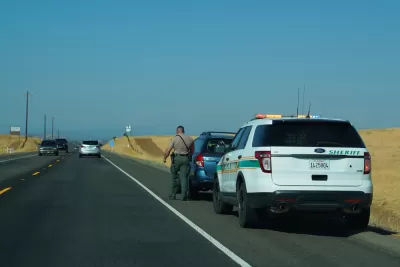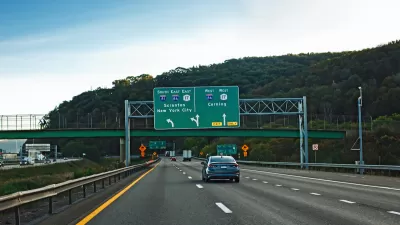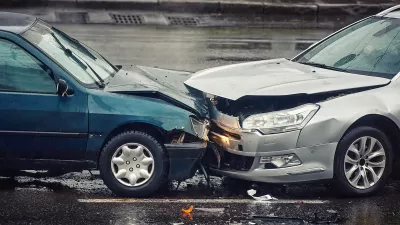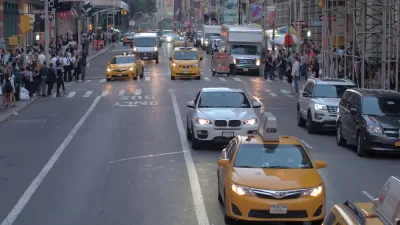A comprehensive study using data from 33 states shows no significant correlation between police stops and reduced crash rates.

Kea Wilson reports on an "explosive new study" that debunks the idea that more frequent traffic stops lead to fewer car crashes. An analysis of over 150 million traffic stops in 33 states "showed that, in the aggregate, there was no significant correlation between high rates of police stops per mile and a low crash rate per mile, or between a high crash rate and a low policing rate."
"Too often, people defend current police traffic practices based on supposed ‘evidence’ of effectiveness, but these are often small-scale analyses that do not show lasting effect of improved traffic safety," said Leah Shahum, founder and director of the Vision Zero Network. "This new study exposes those shortcomings and looks at national-scale data to determine that state traffic-patrol stops are not effective in improving traffic safety."
Because "Black drivers are 63 percent more likely to be stopped in traffic than white drivers, even though they drive 16 percent less" and are "also three times more likely to be killed in such an encounter," advocates say "we must invest in other proven strategies that don’t potentially endanger people of color" to curb traffic deaths. The study's authors conclude that "directing scarce resources to effective strategies such as rural and urban infrastructural changes, motor-vehicle modifications with advanced lifesaving technology, community-based safety initiatives, improved access to health care, or prioritizing trauma system and improved trauma care is imperative."
FULL STORY: STUDY: Police Stops Don’t Stop Car Crashes

Planetizen Federal Action Tracker
A weekly monitor of how Trump’s orders and actions are impacting planners and planning in America.

San Francisco's School District Spent $105M To Build Affordable Housing for Teachers — And That's Just the Beginning
SFUSD joins a growing list of school districts using their land holdings to address housing affordability challenges faced by their own employees.

The Tiny, Adorable $7,000 Car Turning Japan Onto EVs
The single seat Mibot charges from a regular plug as quickly as an iPad, and is about half the price of an average EV.

Seattle's Plan for Adopting Driverless Cars
Equity, safety, accessibility and affordability are front of mind as the city prepares for robotaxis and other autonomous vehicles.

As Trump Phases Out FEMA, Is It Time to Flee the Floodplains?
With less federal funding available for disaster relief efforts, the need to relocate at-risk communities is more urgent than ever.

With Protected Lanes, 460% More People Commute by Bike
For those needing more ammo, more data proving what we already knew is here.
Urban Design for Planners 1: Software Tools
This six-course series explores essential urban design concepts using open source software and equips planners with the tools they need to participate fully in the urban design process.
Planning for Universal Design
Learn the tools for implementing Universal Design in planning regulations.
Smith Gee Studio
City of Charlotte
City of Camden Redevelopment Agency
City of Astoria
Transportation Research & Education Center (TREC) at Portland State University
US High Speed Rail Association
City of Camden Redevelopment Agency
Municipality of Princeton (NJ)





























